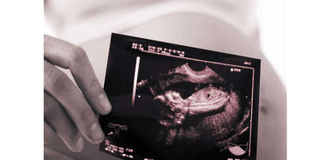Antenatal care crucial in detecting abnormalities

Pregnant woman holding an ultrasound scan image of her foetus. Scans help determine age of pregnancy, whether a woman is carrying multiple babies and foetal abnormalities. PHOTO| FOTOSEARCH
A woman should seek antenatal care within the first two to three months of pregnancy. Up to 90 per cent of foetal anomalies can be detected through ultrasound scans, blood tests and amniotic fluid screening.
Most abnormalities of the brain, spinal cord, abdomen and kidneys and some heart problems can be seen during pregnancy. The anomaly scan done at around 20 weeks identifies most of the major structural abnormalities.
However, some anomalies are only seen at birth or during autopsy in the event of death. Genetic anomalies without obvious defects can only be diagnosed through foetal testing.
Structural birth defects are either lethal, or compatible with life. They include heart defects, cleft lip, excessive fluid in the brain, clubfoot and spinal bifida. They can be treated or corrected through medication, surgery and proper home care.
Functional or developmental birth defects may not exhibit obvious anomalies. They include Down syndrome, sickle cell disease and cystic fibrosis.
RISK FACTORS
Parents should be counselled on the nature of the deformity and treatment options available in pregnancy or after birth. They should also be informed of the special needs the child may have in future.
The parents may choose to carry on with the pregnancy despite the abnormality, or opt to terminate it.
Advanced maternal age (over 40 years), genetic disorders in the family, excessive alcohol consumption, and smoking or drug abuse during pregnancy have been associated with genetic or structural anomalies in babies.
Other risk factors include use of some medications prior to conception or during early pregnancy, lack of folic acid supplementation prior to conception, exposure to chemicals, toxins and radiation, viral infections, and pre-existing medical conditions such as diabetes or epilepsy.
Most abnormalities, especially those of the heart can be corrected immediately after delivery. Some like spinal bifida can be prevented by taking folic acid before conception.
Women should seek early prenatal screening and testing to avoid unpleasant surprises at birth.
Dr Wanyonyi is a foetal medicine specialist, while Prof Temmerman is the chair Department of Obstetrics and Gynaecology at Aga Khan University Hospital, Nairobi

